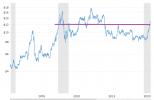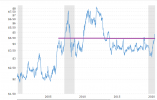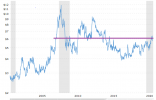Same with the stock market. It's ALL speculation. If some bit of news hits, any given stock - or the whole market - can tumble. Intrinsic value and market value are seldom the same. What's listed as $100 per share today can be at $10 tomorrow. Same buildings, same inventory, same prospects ............... different day.
That's why I've followed Bogle, Buffet, et al for their low-cost, broad diversification strategy. Side bets on good dividend-payers.
Biggest miss all-time for me .......... Amazon when it first came out.

Thought about that as a single-stock investment. Woulda, coulda, shoulda. Still in great shape though!! One of my best moves ...... investing with Mutual Shares fund years ago run first by Max Heine, then by his protege Michael Price. THAT MAN made money!!!!!! He specialized in distressed companies, distressed debt, mergers, LBO's, etc. He made the cover of - if I remember correctly - Fortune or Forbes magazine with the cover title of "The Scariest S.O.B. on Wall Street." Michael Price KICKED ASS !!!!!!!!!! One of my actively-managed hits.



